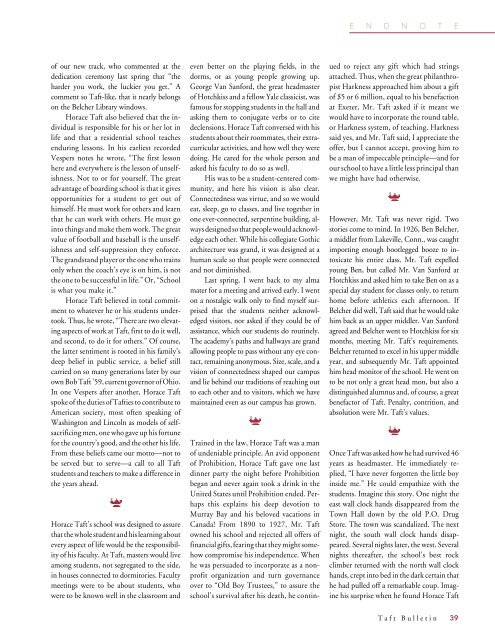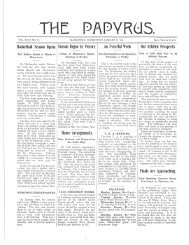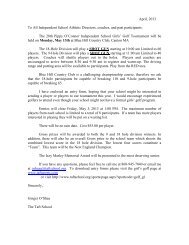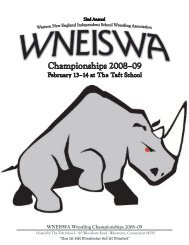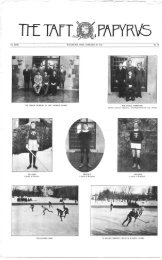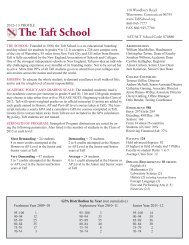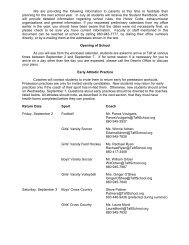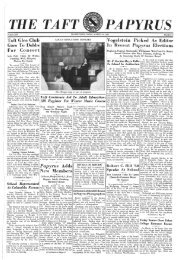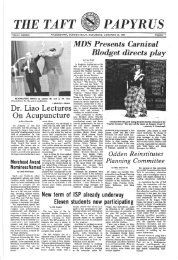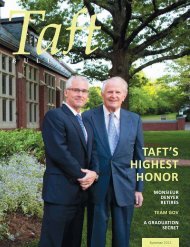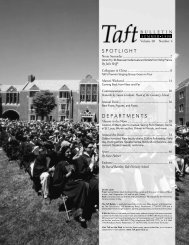Farewell to the Oddens Farewell to the Oddens - The Taft School
Farewell to the Oddens Farewell to the Oddens - The Taft School
Farewell to the Oddens Farewell to the Oddens - The Taft School
Create successful ePaper yourself
Turn your PDF publications into a flip-book with our unique Google optimized e-Paper software.
E N D N O T E<br />
of our new track, who commented at <strong>the</strong><br />
dedication ceremony last spring that “<strong>the</strong><br />
harder you work, <strong>the</strong> luckier you get.” A<br />
comment so <strong>Taft</strong>-like, that it nearly belongs<br />
on <strong>the</strong> Belcher Library windows.<br />
Horace <strong>Taft</strong> also believed that <strong>the</strong> individual<br />
is responsible for his or her lot in<br />
life and that a residential school teaches<br />
enduring lessons. In his earliest recorded<br />
Vespers notes he wrote, “<strong>The</strong> first lesson<br />
here and everywhere is <strong>the</strong> lesson of unselfishness.<br />
Not <strong>to</strong> or for yourself. <strong>The</strong> great<br />
advantage of boarding school is that it gives<br />
opportunities for a student <strong>to</strong> get out of<br />
himself. He must work for o<strong>the</strong>rs and learn<br />
that he can work with o<strong>the</strong>rs. He must go<br />
in<strong>to</strong> things and make <strong>the</strong>m work. <strong>The</strong> great<br />
value of football and baseball is <strong>the</strong> unselfishness<br />
and self-suppression <strong>the</strong>y enforce.<br />
<strong>The</strong> grandstand player or <strong>the</strong> one who trains<br />
only when <strong>the</strong> coach’s eye is on him, is not<br />
<strong>the</strong> one <strong>to</strong> be successful in life.” Or, “<strong>School</strong><br />
is what you make it.”<br />
Horace <strong>Taft</strong> believed in <strong>to</strong>tal commitment<br />
<strong>to</strong> whatever he or his students under<strong>to</strong>ok.<br />
Thus, he wrote, “<strong>The</strong>re are two elevating<br />
aspects of work at <strong>Taft</strong>, first <strong>to</strong> do it well,<br />
and second, <strong>to</strong> do it for o<strong>the</strong>rs.” Of course,<br />
<strong>the</strong> latter sentiment is rooted in his family’s<br />
deep belief in public service, a belief still<br />
carried on so many generations later by our<br />
own Bob <strong>Taft</strong> ’59, current governor of Ohio.<br />
In one Vespers after ano<strong>the</strong>r, Horace <strong>Taft</strong><br />
spoke of <strong>the</strong> duties of <strong>Taft</strong>ies <strong>to</strong> contribute <strong>to</strong><br />
American society, most often speaking of<br />
Washing<strong>to</strong>n and Lincoln as models of selfsacrificing<br />
men, one who gave up his fortune<br />
for <strong>the</strong> country’s good, and <strong>the</strong> o<strong>the</strong>r his life.<br />
From <strong>the</strong>se beliefs came our mot<strong>to</strong>—not <strong>to</strong><br />
be served but <strong>to</strong> serve—a call <strong>to</strong> all <strong>Taft</strong><br />
students and teachers <strong>to</strong> make a difference in<br />
<strong>the</strong> years ahead.<br />
Horace <strong>Taft</strong>’s school was designed <strong>to</strong> assure<br />
that <strong>the</strong> whole student and his learning about<br />
every aspect of life would be <strong>the</strong> responsibility<br />
of his faculty. At <strong>Taft</strong>, masters would live<br />
among students, not segregated <strong>to</strong> <strong>the</strong> side,<br />
in houses connected <strong>to</strong> dormi<strong>to</strong>ries. Faculty<br />
meetings were <strong>to</strong> be about students, who<br />
were <strong>to</strong> be known well in <strong>the</strong> classroom and<br />
even better on <strong>the</strong> playing fields, in <strong>the</strong><br />
dorms, or as young people growing up.<br />
George Van Sanford, <strong>the</strong> great headmaster<br />
of Hotchkiss and a fellow Yale classicist, was<br />
famous for s<strong>to</strong>pping students in <strong>the</strong> hall and<br />
asking <strong>the</strong>m <strong>to</strong> conjugate verbs or <strong>to</strong> cite<br />
declensions. Horace <strong>Taft</strong> conversed with his<br />
students about <strong>the</strong>ir roommates, <strong>the</strong>ir extracurricular<br />
activities, and how well <strong>the</strong>y were<br />
doing. He cared for <strong>the</strong> whole person and<br />
asked his faculty <strong>to</strong> do so as well.<br />
His was <strong>to</strong> be a student-centered community,<br />
and here his vision is also clear.<br />
Connectedness was virtue, and so we would<br />
eat, sleep, go <strong>to</strong> classes, and live <strong>to</strong>ge<strong>the</strong>r in<br />
one ever-connected, serpentine building, always<br />
designed so that people would acknowledge<br />
each o<strong>the</strong>r. While his collegiate Gothic<br />
architecture was grand, it was designed at a<br />
human scale so that people were connected<br />
and not diminished.<br />
Last spring, I went back <strong>to</strong> my alma<br />
mater for a meeting and arrived early. I went<br />
on a nostalgic walk only <strong>to</strong> find myself surprised<br />
that <strong>the</strong> students nei<strong>the</strong>r acknowledged<br />
visi<strong>to</strong>rs, nor asked if <strong>the</strong>y could be of<br />
assistance, which our students do routinely.<br />
<strong>The</strong> academy’s paths and hallways are grand<br />
allowing people <strong>to</strong> pass without any eye contact,<br />
remaining anonymous. Size, scale, and a<br />
vision of connectedness shaped our campus<br />
and lie behind our traditions of reaching out<br />
<strong>to</strong> each o<strong>the</strong>r and <strong>to</strong> visi<strong>to</strong>rs, which we have<br />
maintained even as our campus has grown.<br />
Trained in <strong>the</strong> law, Horace <strong>Taft</strong> was a man<br />
of undeniable principle. An avid opponent<br />
of Prohibition, Horace <strong>Taft</strong> gave one last<br />
dinner party <strong>the</strong> night before Prohibition<br />
began and never again <strong>to</strong>ok a drink in <strong>the</strong><br />
United States until Prohibition ended. Perhaps<br />
this explains his deep devotion <strong>to</strong><br />
Murray Bay and his beloved vacations in<br />
Canada! From 1890 <strong>to</strong> 1927, Mr. <strong>Taft</strong><br />
owned his school and rejected all offers of<br />
financial gifts, fearing that <strong>the</strong>y might somehow<br />
compromise his independence. When<br />
he was persuaded <strong>to</strong> incorporate as a nonprofit<br />
organization and turn governance<br />
over <strong>to</strong> “Old Boy Trustees,” <strong>to</strong> assure <strong>the</strong><br />
school’s survival after his death, he continued<br />
<strong>to</strong> reject any gift which had strings<br />
attached. Thus, when <strong>the</strong> great philanthropist<br />
Harkness approached him about a gift<br />
of $5 or 6 million, equal <strong>to</strong> his benefaction<br />
at Exeter, Mr. <strong>Taft</strong> asked if it meant we<br />
would have <strong>to</strong> incorporate <strong>the</strong> round table,<br />
or Harkness system, of teaching. Harkness<br />
said yes, and Mr. <strong>Taft</strong> said, I appreciate <strong>the</strong><br />
offer, but I cannot accept, proving him <strong>to</strong><br />
be a man of impeccable principle—and for<br />
our school <strong>to</strong> have a little less principal than<br />
we might have had o<strong>the</strong>rwise.<br />
However, Mr. <strong>Taft</strong> was never rigid. Two<br />
s<strong>to</strong>ries come <strong>to</strong> mind. In 1926, Ben Belcher,<br />
a middler from Lakeville, Conn., was caught<br />
importing enough bootlegged booze <strong>to</strong> in<strong>to</strong>xicate<br />
his entire class. Mr. <strong>Taft</strong> expelled<br />
young Ben, but called Mr. Van Sanford at<br />
Hotchkiss and asked him <strong>to</strong> take Ben on as a<br />
special day student for classes only, <strong>to</strong> return<br />
home before athletics each afternoon. If<br />
Belcher did well, <strong>Taft</strong> said that he would take<br />
him back as an upper middler. Van Sanford<br />
agreed and Belcher went <strong>to</strong> Hotchkiss for six<br />
months, meeting Mr. <strong>Taft</strong>’s requirements.<br />
Belcher returned <strong>to</strong> excel in his upper middle<br />
year, and subsequently Mr. <strong>Taft</strong> appointed<br />
him head moni<strong>to</strong>r of <strong>the</strong> school. He went on<br />
<strong>to</strong> be not only a great head mon, but also a<br />
distinguished alumnus and, of course, a great<br />
benefac<strong>to</strong>r of <strong>Taft</strong>. Penalty, contrition, and<br />
absolution were Mr. <strong>Taft</strong>’s values.<br />
Once <strong>Taft</strong> was asked how he had survived 46<br />
years as headmaster. He immediately replied,<br />
“I have never forgotten <strong>the</strong> little boy<br />
inside me.” He could empathize with <strong>the</strong><br />
students. Imagine this s<strong>to</strong>ry. One night <strong>the</strong><br />
east wall clock hands disappeared from <strong>the</strong><br />
Town Hall down by <strong>the</strong> old P.O. Drug<br />
S<strong>to</strong>re. <strong>The</strong> <strong>to</strong>wn was scandalized. <strong>The</strong> next<br />
night, <strong>the</strong> south wall clock hands disappeared.<br />
Several nights later, <strong>the</strong> west. Several<br />
nights <strong>the</strong>reafter, <strong>the</strong> school’s best rock<br />
climber returned with <strong>the</strong> north wall clock<br />
hands, crept in<strong>to</strong> bed in <strong>the</strong> dark certain that<br />
he had pulled off a remarkable coup. Imagine<br />
his surprise when he found Horace <strong>Taft</strong><br />
<strong>Taft</strong> Bulletin 39


